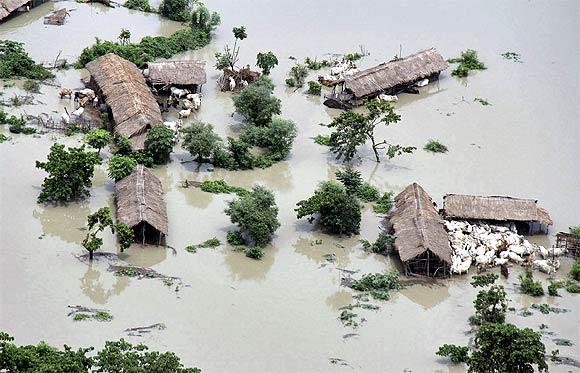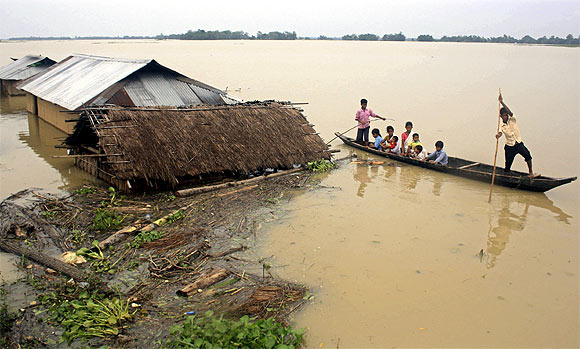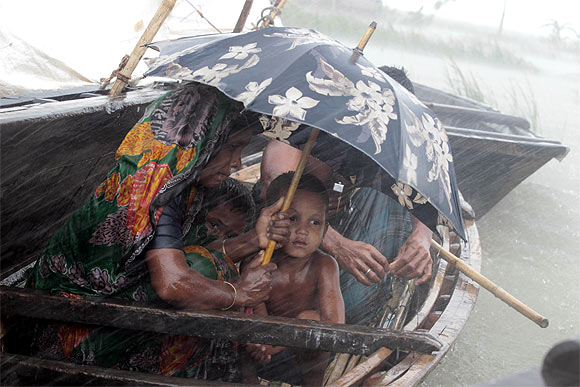
Climate change has induced erratic rainfall patterns, especially in South Asia, experts tell Syed Tashfin Chowdhury
Nearly 200 people have died and lakhs have been displaced due to the torrential rainfall that has been lashing Assam, Bangladesh and Myanmar. Experts have claimed that the erratic rainfall that led to the calamity was mostly due to climate change, which has had a severe effect on South Asia.
According to media reports, over 20 lakh people have been affected by the "worst floods in recent years, causing large-scale devastation in 2,809 villages in 27 of the 28 districts of Assam".
Due to incessant rainfall, 131 people have died in Bangladesh so far, according to the situation report of the Comprehensive Disaster Management Programme.
Due to the heavy rains, most road and rail links between Chittagong and the rest of the country have been suspended. The local airport was closed for two days after water inundated parts of the runway.
Click on NEXT for more...

In Myanmar, nearly 2,000 families were displaced and hundreds of houses were inundated following floods in three areas of the country.
In May this year, flash floods due to rainfall resulted in the deaths of 69 people in the provincial capital of Sari Pul and Takhar in Afghanistan. The floods also left thousands homeless.
Floods in Pakistan last year killed hundreds and displaced at least 80 lakh people.
Experts in Bangladesh say climate change has induced erratic and extreme rainfalls, especially in the South Asia region.
Professor Ainun Nishat, a climate analyst, said recently, "Climate change causes too much rainfall over short periods, leading to adrupt floods."
Click on NEXT for more...

Mohammad Abdul Qayyum, national project director of the Comprehensive Disaster Management Programme of the government of Bangladesh, said there is an increasing change in the conventional climate characteristics of countries like Bangladesh.
"This time, the frequency of rainfall in Chittagong was unprecedented," he said, adding that the intensity of rainfall, flooding, cyclone and drought are on the rise in Bangladesh.
A report of the Asian Development Bank titled Addressing Climate Change and Migration in Asia and the Pacific, released on March 12 this year, stated that Bangladesh is the world's most vulnerable country to climate change-related risk factors.
The report states that Asia and the Pacific have six of the world's 10 countries most vulnerable to climate change. Bangladesh tops this list followed by India (2nd), Nepal (4th), the Philippines (6th), Afghanistan (8th) and Myanmar (10th).
Click on NEXT for more...

The report also says that more than 4.2 crore people in the region have been displaced by environmental disasters over the past two years. An undetermined number of those displaced become migrants as they are unable to return home and choose to relocate to safer grounds.
The fourth assessment report of the Intergovernmental Panel on Climate Change shows that the mean temperature of the earth has been increasing at a rate of 0.74 degree centigrade per century. It also found that climate change has a profound impact on rainfall intensity and variability.
Experts pointed out that floods, cyclones and erosions are not only results of climate degradation; these have an impact on the country's economic development as well.
Click on NEXT for more...

The impacts of these disasters threaten water, food, health, livelihood and social security of people, said Dr Atiq Rahman, executive director of the Bangladesh Centre for Advanced Studies.
With a rise in the sea level, saline water will intrude into costal areas. This will cause erratic rainfalls and droughts that will affect food production.
Experts point out that although South Asian countries make the least contribution to climate degradation, they are currently the victims of the crisis being wrought worldwide.
They have demanded risk assessment and evaluation of the changes in a collective manner for South Asian countries and compensation from the developed economies, which have contributed toward climate change and such natural disasters.
Click on NEXT for more...
...